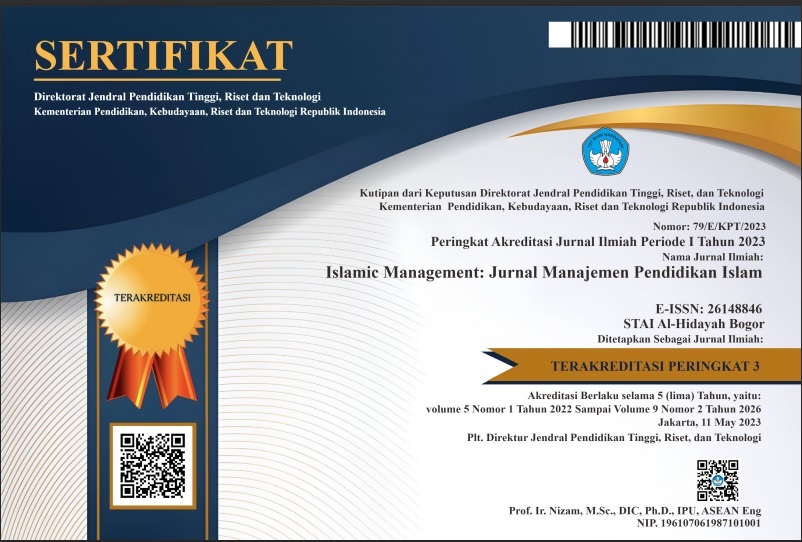TRANSFORMATIONAL LEADERSHIP MANAGEMENT MI LUTHFUL ULUM IN ACHIEVING AN EXCELLENT MADRASAH
DOI:
https://doi.org/10.30868/im.v8i02.8546Keywords:
Management, Leadership, Transformational, Madrasah, Excellent.Abstract
MI Luthful Ulum's Transformational Leadership Management in Achieving Excellent Madrasa in Pati Regency. MI Luthful Ulum's Transformational Leadership Management in Achieving Superior Madrasas in Pati Regency is as follows: 1) the principal's transformational leadership can be interpreted as the form or style applied by the principal in influencing his subordinates (teachers, administrative staff, and all employees) to achieve performance and desired educational goals. 2) The main principle of transformational leaders is that they have high competence and vision to realize success, leaders can inspire subordinates to respond with great enthusiasm and commitment to achieving goals. 3) Transformational leadership will have a positive influence on the relationship between superiors and subordinates in Islamic education. With the concept of transformational leadership, subordinates will feel trust, admiration, pride, loyalty and respect for their superiors and will be motivated to do work with results that exceed the targets that have been determined together. These positive changes such as setting an example, such as leaders showing professional behavior in the teaching and learning process, honesty, discipline (on time), ability to collaborate and relationships between students and teachers will influence teachers at Islamic Education Institutions. 4) Implementation of MI Luthful Ulum's transformational leadership management in achieving superior madrasas in the District. Pati in the picture above there are 4 descriptions of transformational leadership, such as leaders who pay attention to the needs of subordinates, leaders who raise issues of need to a higher level, leaders who listen to subordinates' problems at work, and leaders who build subordinates' self-confidence.
References
Abdurrahman Fathoni. Organisasi dan Manajemen Sumber Daya Manusia. Rineka Cipta: Jakarta, 2016.
Budi W Soetjipto. Paradigma Manajemen Sumber Daya Manusia. Amara Books: Banten, 2015.
Danang Sunyoto dan Burhanudin. Perilaku Organisasional. CAPS: Yogyakarta, 2011.
Danang Sunyoto. Manajemen Sumber Daya Manusia. CAPS, Yogyakarta, 2013.
Didin Hafidhuddin dan Hendri Tanjung. Manajemen Syariah dalam Praktik. Jakarta: Gema Insani, 2008.
Hadari Nawawi. Manajemen Sumber Daya Manusia. Gajah Mada University Pers: Yogyakarta, 2011.
Husaini Usman. Manajemen: Teori, Praktik, dan Riset Pendidikan. Jakarta: Bumi Aksara, 2014.
Meldona. Manajemen Sumber Daya Manusia Perspektif Integratif. Malang: UMP 2019, Hal., 234.
Nana Herdiana Abdurrahman. Manajemen Bisnis Syariah dan Kewirausahaan. Pustaka Setia: Bandung, 2013.
Paul Hersey dan Ken Blanchard. Manajemen Perilaku Manusia Jakarta: Erlangga, 2004.
Richard L. Draft. Era Baru Manajemen. Jakarta: Salemba Empat, 2012.
Sri Budi Cantika Yuli. Manajemen Sumber Daya Manusia. UMM Press: Malang, 2005.
Stephen P. Robbin & Mary Coulter. Manajemen. Jakarta: Indeks, 2007.
Surya Dharma. Manajemen Kinerja Falsafah Teori dan Penerapannya. Pustaka Pelajar: Yogyakarta, 2019.
Susilo Martoyo. Manajemen Sumber Daya Manusia. Yogyakarta: BPFE, 2017.
Toto Tasmara. Membudayakan Etos Kerja Islami. Jakarta: Gema Insani, 2019.
Wahibur Rokhman. Manajemen Sumber Daya Manusia. Nora Media Interprise: Kudus, 2011.
Wibowo. Manajemen Kinerja. Raja grafindo Persada, Jakarta, 2013.
Downloads
Published
How to Cite
Issue
Section
Citation Check
License
Copyright (c) 2025 Kunarso Kunarso, Islah Islah, Sujito Sujito

This work is licensed under a Creative Commons Attribution-ShareAlike 4.0 International License.
Authors who publish with this journal agree to the following terms:
- Authors retain copyright and grant the journal right of first publication with the work simultaneously licensed under a Creative Commons Attribution License that allows others to share the work with an acknowledgment of the work's authorship and initial publication in this journal.
- Authors are able to enter into separate, additional contractual arrangements for the non-exclusive distribution of the journal's published version of the work (e.g., post it to an institutional repository or publish it in a book), with an acknowledgment of its initial publication in this journal.
- Authors are permitted and encouraged to post their work online (e.g., in institutional repositories or on their website) prior to and during the submission process, as it can lead to productive exchanges, as well as earlier and greater citation of published work (See The Effect of Open Access).






